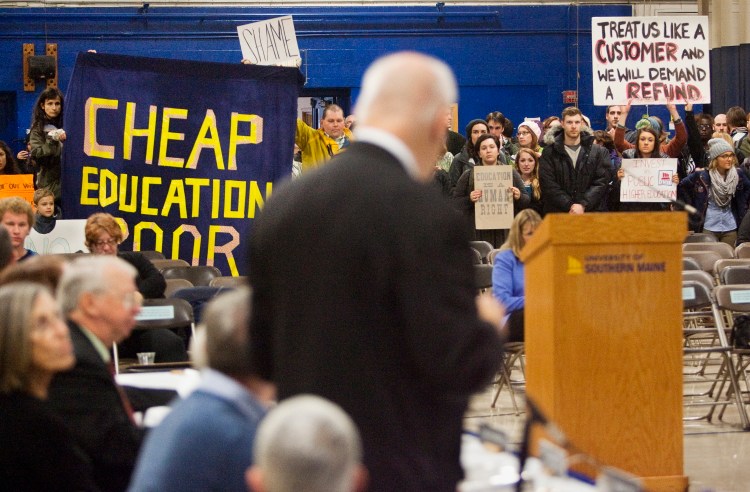The University of Maine System would have to sharply increase tuition, get nearly 40 percent more in state funding or lay off hundreds of employees to avoid a worst-case financial scenario that envisions a potential $90 million deficit by 2020.
The system will “need to implement course-changing actions,” according to the latest five-year financial analysis, which was presented to the board of trustees meeting Monday at the University of Southern Maine in Portland.
The meeting was disrupted by about 100 students protesting the latest cuts at USM. The group flooded into the meeting area during the lunch break, chanting and shouting and taking over the trustees’ seats at the table for about 30 minutes. The meeting resumed after about 45 minutes, when the protesters moved to the audience seats.
In recent months, the trustees have voted to end five academic programs at USM, and the campus administration has eliminated 50 faculty positions.
The USM cuts are just the latest effort to curb a string of multimillion-dollar deficits that have beset the university system for years. Each of the system’s seven campuses has made deep cuts to programs and personnel to reduce costs, but the financial problems persist, largely because of flat state funding, declining enrollment and a freeze in tuition, officials say.
Heading off the projected deficits will be “very challenging,” said Rebecca Wyke, the university system’s vice chancellor for administration and finance.
The projections are based on trends in the system’s current $529 million budget. The worst-case projection of a $90 million deficit assumes that tuition stays frozen and that the Legislature does not increase the annual state allocation.
That projection could be cut to $59 million if tuition revenue and the state appropriation increase annually at the same rate as the consumer price index, and if the system can reduce health care costs, which are expected to rise 7 percent a year. The price index is currently 1.7 percent.
Wyke outlined four potential scenarios, any one of which would completely close the $59 million budget gap:
• Increasing the state appropriation by 7.4 percent annually through 2020.
• Increasing tuition by 5.5 percent annually.
• Increasing enrollment by 4.2 percent annually.
• Reducing the workforce by 14.5 percent, or 685 full-time equivalent employees.
Increasing enrollment in particular would be “extremely difficult” because Maine’s 15- to 24-year-old population is expected to decline by 19.5 percent between 2010 and 2020, Wyke said. Getting a sharp increase in state allocations is equally unlikely, she said.
“Merely maintaining current enrollments will be challenging,” she said.
In other business Monday, Chancellor James Page told trustees that the Harold Alfond Foundation has provided $1.25 million to pursue a plan to combine some graduate programs and house them in a new Portland-based graduate center.
The initial proposal envisions a program involving faculty members from the two business schools – at the University of Maine in Orono and USM – and the University of Maine School of Law, which is housed on the USM campus in Portland. In the future, other graduate programs may be added.
A consultant from Parthenon Group of Boston, hired in February with $500,000 from the Harold Alfond Foundation to explore the concept, told trustees that Parthenon found broad support in the local business and legal communities for a graduate center.
Page said the new Alfond grant would be used to develop the plan, including hiring someone to lead the planning development process, to work with private industry and to “test the core concepts with targeted pilot offerings.”
Some trustees questioned whether the system should forge ahead with a new center and graduate program in the midst of financial problems, while others said it needed to find growth areas to increase revenue and rebuild.
“The system is evolving,” said trustee Kurt Adams. “We should be trimming the sails (through cuts) but investing in areas where students and the state of Maine are going. Fixing the boat while you are sailing it is really hard, but it’s what we have to do.”
The trustees also approved a new sexual assault policy, bringing the system in line with federal Department of Education regulations that require colleges nationwide to do more to deter sexual assaults on campus and provide victims with resources and support.
“At the end of the day, it’s about having a culture on all our campuses that does not tolerate this behavior,” said trustee Gregory Johnson, who chaired the trustee committee overseeing efforts to update the policy. “It’s going to take leadership on all of our campuses.”
Among the changes are ensuring that the system’s 30,000-plus students, faculty and staff are all trained in the new policy, and creating a distinction between campus officials investigating an allegation and the campus members who are providing support services to a victim.
Some issues are still being worked out, Johnson said, such as whether the system should have a full-time trained investigator, or if campuses should have them.
Send questions/comments to the editors.






Success. Please wait for the page to reload. If the page does not reload within 5 seconds, please refresh the page.
Enter your email and password to access comments.
Hi, to comment on stories you must . This profile is in addition to your subscription and website login.
Already have a commenting profile? .
Invalid username/password.
Please check your email to confirm and complete your registration.
Only subscribers are eligible to post comments. Please subscribe or login first for digital access. Here’s why.
Use the form below to reset your password. When you've submitted your account email, we will send an email with a reset code.